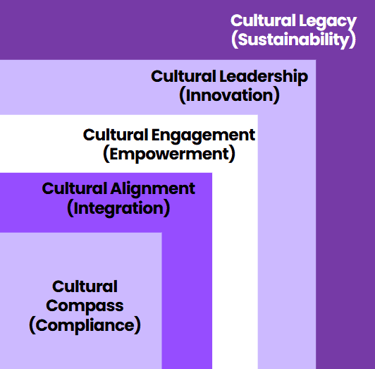Why Checking In on Culture Matters
Culture is not a “set and forget”. Left unchecked, organisational culture can fragment into subcultures, and in the worst-case scenario, toxicity can take over. Regularly assessing your cultural maturity allows you to identify where gaps may be forming and take proactive steps to ensure alignment with your core values.
2 min read


A strong organisational culture is essential for high performance—teams that feel empowered, connected, and aligned with a shared purpose consistently outperform those in other environments. However, when company culture isn’t actively nurtured, subcultures and toxicity can emerge, leading to disengaged employees, decreased productivity, and silos.
Unchecked, these issues can harm your company’s performance and employee satisfaction, causing long-term damage. That’s why assessing cultural maturity regularly is crucial. When culture is monitored and actively improved, it creates a healthy work environment that drives business success.
The Consequences of Ignoring Cultural Health
Imagine a team that was once highly motivated, now feeling disengaged due to a lack of direction and communication. This is a common scenario when organisational culture deteriorates. Over time, as managers stop checking in on their corporate culture, employees may stop sharing ideas, and the overall sense of belonging diminishes.
Even worse, subcultures can form—creating pockets of behaviour that contradict the organisation’s core values. These subcultures may foster negative behaviours, undermining leadership’s vision and creating a toxic environment. Without regular cultural assessments, organisations often fail to identify these shifts before it’s too late.
Step-by-Step: How to Maintain a Strong Organisational Culture
Organisations with a strong culture don’t leave it to chance. Just as they monitor financial metrics, leaders need to regularly assess their culture to ensure it aligns with their business goals. The more mature and intentional a company’s culture is, the more resilient it will be in handling challenges, such as organisational change or external market pressures.If you're ready to check in on your organisation’s culture, here’s how:
Step 1: Complete a Culture Health Check
Start with a thorough cultural audit. Our Culture Health Check tool allows organisations to evaluate cultural maturity across key dimensions. This step will help you pinpoint areas that need attention.
Step 2: Involve your team
Culture is experienced differently across various levels of your company. To get a comprehensive picture, ask members from different departments and leadership levels to complete the cultural survey. Their feedback will provide valuable insights into what’s working and where improvements are needed.
Step 3: Discuss results openly
Once the data is in, sit down with your leadership team or managers to discuss the findings. Identify areas where the organisation excels and where opinions diverge. For example, if leadership believes communication is clear but employees feel disconnected, this signals a gap in your communication. Open dialogue will allow you to recognise underlying issues that might otherwise be overlooked.
Step 4: Prioritise action
Based on the insights gathered, prioritise the actions needed to improve your culture. Focus not only on fixing opportunities but also on amplifying strengths. For example, if collaboration is a cultural strength, find ways to enhance it across departments. A successful culture transformation involves leveraging what already works, alongside addressing areas of concern.
Step 5: Embed changes
Cultural shifts don’t happen overnight. Embed the necessary changes into your organisation’s daily practices. Whether that’s improved communication, recognition programs, or revisiting leadership development, make sure these changes become an integral part of your workplace DNA.
The Link Between Culture and Business Performance
Research shows that a strong company culture directly impacts employee engagement, innovation, and financial performance. Organisations that actively cultivate their culture have higher employee retention, improved team performance, and a greater ability to adapt to changes in the market. By regularly checking in on your culture, you’re ensuring your organisation is set up for long-term success.
Don't wait for problems to surface. Proactively checking the health of your company culture can prevent issues like disengagement, subcultures, and toxicity.
Culture Edge acknowledges the Wadawurrung People of Djilang (Geelong), where we’re based, and the many First Nations across Australia where we work. We’re committed to listening, learning, and helping create respectful, culturally safe places to work.
